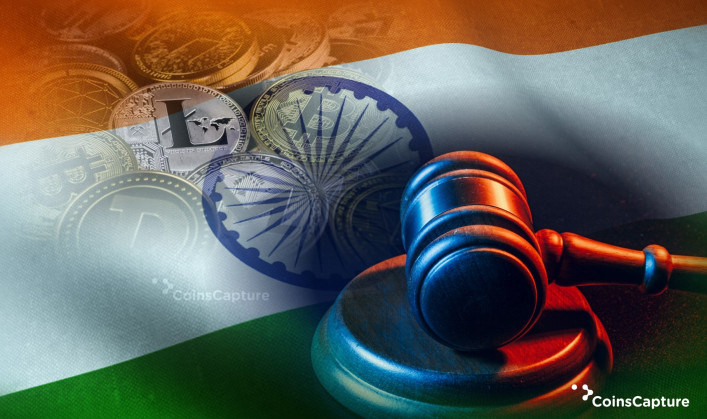7 November 2025
India Passed Stiff Crypto Tax Laws Despite Market Outcry
Parliament enacted a contentious tax plan in March 2022, and from the following week, Indians had been required to pay a capital gains tax of 30% on Crypto transactions, causing widespread outrage and dissatisfaction in the nation's Cryptocurrency business. Investors in India would be subject to a 1% Tax Deducted at Source (TDS) when they acquire or sell Cryptocurrency, and to taxes on Cryptocurrency gifting, without any loss carryforwards allowed.
Also Read: 10 Advantages Of Cryptocurrency Trading In India In 2022
What the Government Said?
Nirmala Sitharaman, India's minister of finance, proposed the idea and helped it pass the House of Representatives. In India, the function of the upper house in financial legislation is limited to making proposals. At least twenty members of the House of Commons voiced strong opposition to the measure, with many expressing concern that the law's Cryptocurrency definition and the associated taxes would effectively wipe out the business. Sitharaman also said that there is no confused signal and that they have been quite obvious that discussions are ongoing regarding whether they want to restrict it to a certain level or indeed quite substantially or entirely prohibit it. The Indian government is taxing Cryptocurrency, due to the profits it generates for some. After the taxation was initially suggested in February, the Crypto sector pushed against the measure via meetings with politicians and a change.org petition and web campaign. This was hoped that the TDS or capital gains tax would be reduced, however that was not the case.
Also Read: 5 Best Cryptocurrency Exchanges In Finland
Industry Responds
The Cryptocurrency business in India reacted strongly, with many saying that the bill's passage without favorable modifications is "more destructive than helpful" and would stunt the development of the sector as a whole. Nischal Shetty, among the most famous Cryptocurrency speakers in India as well as founder and CEO of WazirX, one of India's major Crypto exchanges, has said that this is not favorable for the government or the Crypto ecosystem of India, and is likely to do more damage than good. This has the potential to increase the movement of money out of the Indian market and onto international markets. Previously, Sumit Gupta, Chairman of CoinDCX, a major platform in India, stated that perhaps the tax rules may destroy the Cryptocurrency sector, while Sathvik Vishwanath, founder as well as Chairman of Unocoin, other Cryptocurrency exchange, claimed that it was unfortunate that neither of the sector's wishes was met.
Traders will feel the effects of this, notably the 1% TDS tax. This will have an impact on both commerce and tax revenue. Vishwanath hoped that the Cryptocurrency business would be given the same consideration as other investment sectors in the years ahead. The reception was the same in all NFT exchanges. The lack of changes in Crypto taxation rules has deterred businesses as well as individuals from entering the uncertain industry. According to NFT marketplace Colexion CEO and creator Abhay Aggarwal, this would hinder the development of the industry as a whole by lowering the rate of widespread acceptance as well as verification. Trading on a Global Scale OKX (formerly OKEx) was one of the few organizations that viewed the bill's approval favorably. When the government levies a tax on an asset, it means that the asset class is one that is officially recognized for trading. This provides a great deal of clarity to the business on the legitimacy of Cryptocurrency and the profits made from it. According to OKX's director, Lennix Lai, this is great news for the Indian Crypto business since it will help foster the development of a more regulated framework in which Crypto may thrive. In a similar vein, BuyUcoin CEO Shivam Thakral expressed confidence, stating that the government did everything to their knowledge. Even if the government moves slowly, he said, it will have a better understanding of the Cryptocurrency business once it sees trade volumes fall on Cryptocurrency exchanges.
Supreme Court Challenges
Legal expert Rajat Mittal, who advises Crypto companies on tax matters before India's highest court, has also spoken out against the new rule. Despite calls from the Cryptocurrency sector for more lenient tax treatment, the Indian government has instead enacted new regulations that make it more difficult, though not impossible, for regular dealers as well as platforms to operate inside the country. After the taxation was initially suggested in February, the Crypto sector pushed against the measure via meetings with politicians and a change.org petition and web campaign. It was hoped that the TDS or capital gains tax would be reduced, however, which did not happen. If Crypto taxes aren't lowered, the business may take it to the Supreme Court, as was reported earlier by CoinDesk. Such a challenge is unlikely to be taken up by the business right now, but it is still being considered.
If at all possible, this would be the ultimate nuclear alternative. The legislation appears to have hardly budged the needle toward a legal challenge, while most in the business, including Shetty, have been pressing to address the taxes with the government. According to Thakral of BuyUCoin, collaborating is far better than fighting, and he thinks the government will quickly realize the effect of the taxes and implement adjustments. He anticipates that by July 1, the sector will have redoubled its attempts to lower the TDS, at which point he will have no choice but to seek out the Supreme Court. It's something we take precautions against. Petitioners seeking relief from excessive taxes levied by the federal government on a specific class of assets will be denied review by the Supreme Court. Whatever the case may be, all the major players in the Crypto business, including ourselves, have already banded together to take positive action.
Disclaimer: The author’s thoughts and comments are solely for educational reasons and informative purposes only. They do not represent financial, investment, or other advice.






